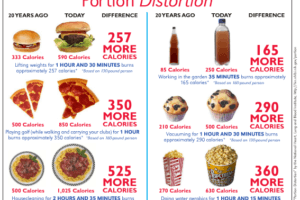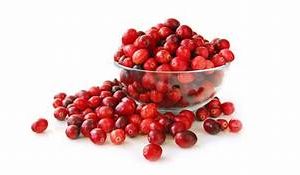40 Million lbs of Produce Saved from Waste! 1.2 Billion lbs of Water Saved! 1.5 Million lbs of Produce Donated! Get a big, beautiful box of slightly imperfect, but utterly fresh and delicious produce delivered to your doorstep at great prices (30% less). You have the option to customize your boxes and plenty of organic produce to choose from. Help save our planet, help heal your body, and wake up to a box full of vitality! Order your box by the end of March 2019 and use the promo code – POSITIVECHOICE50 and get HALF OFF YOUR FIRST box!!!!!!!!!!...
Read More
Portion vs Serving Size
An important part about eating healthy is choosing the appropriate amounts of food to eat. When it comes to deciding how much to eat, the terms serving size and portion size tend to be used interchangeably, but they don’t mean the same thing. Serving size is a standardized amount of food, typically used to quantify recommended amounts by either MyPlate food groups or quantities typically consumed by people on nutrition facts labels. Portion size is the amount of food you choose to eat, which may be more than or less than a serving. Measure foods regularly to get an idea of what serving sizes look like. The more regularly you measure foods, the easier it becomes to pick appropriate amounts of food for your body so that you are not too full or too...
Read More
Don’t Let Food Cravings Derail Your New Year Resolutions!
Twenty-eight scientific studies indicate that bumping up your cardio/strength training and eating a plant-based diet greatly curbs food cravings and can keep you focused on your goals for a healthier...
Read More
FAST Track to Health
Articles with references download here: Fast Track to Health Web 2018 Your body is amazingly resilient and is programmed to heal when given the right environment. Obtaining your optimum health may require you taking a major timeout from current unhealthy lifestyle habits and then working to create new habits that keep you healthy through your entire lifespan. Long hours on the freeway, sedentary jobs, time pressures, stress, lack of sleep, pollution, too much TV, high fat, high sugar diets, too few fruits and vegetables… These habits add up to a great assault on your health and can lead to modern day illnesses like obesity, asthma, diabetes, heart disease, cancer, fatty liver, etc. Although there are medications to manage these illnesses, it is vastly more beneficial for you to alter your lifestyle in ways that keep you healthy and prevent the need for medications. Your body is amazingly resilient and is programmed to heal when given the right environment. Obtaining your optimum health may require you taking a major timeout from current unhealthy lifestyle habits and then working to create new habits that keep you healthy through your entire lifespan. INTERMITTENT FASTING FOR HEALTH One healing modality that provides a timeout from your usual lifestyle is fasting. Many people are afraid to fast because they are afraid of being uncontrollably hungry. The fear of hunger is unfortunate and unfounded. There are many benefits from giving your digestive tract a timeout from calories, and when fasting is done correctly, it can curb appetite. Mark Mattson at John Hopkins University has published some interesting research on fasting. His research team found small intermittent fasts help with weight loss, bolster your immune system, lower blood sugars, lower inflammation, and generate healing in your intestinal tract. Two types of intermittent fasting were tested. The 5/2 method and the 8/16 method.1 The 5/2 method refers to days. Using this method, you lower your daily calories to 500 on two non-consecutive days of the week. The other five days, Mattson recommends eating normal portions of healthy foods. The 8/16 method refers to hours. You eat your normal daily amount of food within eight hours of a 24-hour cycle, and then fast for the remaining 16 hours...
Read MoreThere are over 40 different types of known auto-immune diseases and probably many more that we don’t yet know. Woman are more effected than men. Auto-immune disease occurs when our natural immune system develops antibodies that attack the healthy tissues of our body. Auto-immune disease affects 23 million Americans. It is not entirely clear what causes auto-immune disorders. They tend to cluster in families, indicating it may have a strong genetic predisposition component, but there is probably many different factors that trigger the disruption of our immune system. Depending what area of the body is being attacked the disease can cause different symptoms. When the thyroid is attacked it is expressed as Hashimotto’s thyroiditis or Graves disease. If the adrenals are affected it is Addison’s, the pancreas, Type-1 Diabetes. If the immune system attacks the tissue between joints and bones it is rheumatoid arthritis. In the lining of the GI track it is Chronn’s disease. Even diseases like Asthma, Multiple Sclerosis, Sjoren’s, and some cancers are thought to be auto-immune triggered. It isn’t yet clear what may be causing this to happen. Some research indicates that environmental toxins play a role, especially toxins like the BPA which is commonly found in plastics, cash register receipts, etc., but it is clear that the occurrence of these types of disorders are on the rise. What seems to be clear is that diet plays a major role in both avoiding an auto-immune disease and recovering from one. A low salt, predominately plant based diet has been shown to greatly decrease the inflammation that accompanies auto-immune disease and to greatly reduce symptoms. One study showed that ninety two percent of people with Chronn’s disease were able to avoid a relapse when followed for two years after diagnosis and treatment by eating a whole foods (no processed foods), predominately plants based (fruits, vegetables, whole grains, beans) diet. That is Compare that to the 85% relapse rate of those who did not make any dietary changes. Salt in particular has been shown to aggravate autoimmune disease and some research indicates it may play a role in the development of the disease. The typical American consumes about 12 grams of salt per day. Apparently we have a salt...
Read More
Crazy for Cranberries
Whether it comes in a can, frozen, juiced, dried or fresh, cranberries have a handful of health benefits and disease–fighting powers. These berries can help fight bacteria and inflammation, reduce the risk of heart disease, improve oral health, help prevent ulcers and yeast infections, and may even inhibit the growth of some human cancer cells. Not only are cranberries one of only three berries native to the U.S., in addition to blueberries and grapes, this super–fruit is also teaming with anti–oxidants which help prevent and repair cell damage done by free radicals and are rich in vitamins and fiber. Cranberries are also well known for preventing urinary tract infections however and possibly help if you have an urinary tract infection. Avoid sugary juice cocktails and jellied sauces, which have fewer antioxidants. To get the most benefit for those berries, try the fresher versions. Chopped fresh cranberries mixed with chopped, toasted pecans, a tbsp of orange juice and a bit of honey makes a delicious fresh cranberry salad! Tis the season…enjoy....
Read More
